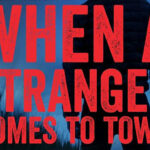Home »

Prather captured a lost age, gone forever
Book Review
By Derryll White
Prather, Richard S. (1957). Three’s A Shroud.
 Sometimes I delight in immersing myself in an earlier and simpler time; a time I remember quite well. The three short stories in this volume were written in 1953, 1954 and 1957, an era in which B.C. still had divided-by-gender beer parlours and a 21 drinking age. All the stories feature private snooper Shell Scott, who carries a gat and collects luscious, wild-looking, toothsomely-torsoed tomatoes. Reader, throw away any sense of politically correct and relax into the roots of the mystery genre.
Sometimes I delight in immersing myself in an earlier and simpler time; a time I remember quite well. The three short stories in this volume were written in 1953, 1954 and 1957, an era in which B.C. still had divided-by-gender beer parlours and a 21 drinking age. All the stories feature private snooper Shell Scott, who carries a gat and collects luscious, wild-looking, toothsomely-torsoed tomatoes. Reader, throw away any sense of politically correct and relax into the roots of the mystery genre.
The language is significantly different, sexist and evocative, and we don’t talk or write like that any more. But it is also more honest and direct than the mommy porn of ‘Shades of Grey’ or the graphic explosion of porn sites and cable tv programmes. Guys still look at women that way – appreciative and with fantasy-shrouded eyes, and women know it. The action here is direct and the men are hunks in the same way that the women are gorgeous. The sex is suggestive rather than real, fuelling the imagination. Richard S. Prather captures a lost age, gone forever.
Set in Los Angeles, Shell Scott’s hometown, the first story, ‘Blood Ballot’, looks at the nasty side of state politics. And of course, Shell Scott gets the woman in the end. The second story, ‘Dead Giveaway’, is about greed and deception. Prather also throws in a touch of the redemptive qualities of love. ‘Hot-Rock Rumble’ is the usual tale about theft, violence and lust, but Prather lets in some of the humanity of the street with Shell Scott caring for a drunken snitch, trying to humanize him.
The writing is hardboiled, the storyline is sometimes thin, but Richard S. Prather clearly captures a black and white world that is now gone forever – lost in the global village and the new liberal sense of understanding and forgiveness. In Shell Scott’s universe there is love and hate, good and bad, rich and poor, and a clear understanding of the healing qualities of love and lust. There will certainly be those readers who will say that this kind of clarity has had its day and we are lucky to have left it behind. But perhaps before dismissing it all as archaic and historic readers should try a sample of Richard S. Prather. They might discover that something essential has been lost in today’s cell-phone world.
****
Excerpts from the collection:
DELIGHTS OF THE FIFTIES – Halfway through my highball I glanced at the front door as it opened and a blonde babe wearing a strapless tan dress came inside. All I noticed about the guy behind her was that he was tall, because the woman demanded all a man’s attention. She was in her middle twenties, maybe five-four, and shaped to drive women into hysterics.
BURLESQUE – The number was Diane, played slowly and deliberately, and Ilona was slow and deliberate in her movements, of which there were a great many, and many of them great. She was tall, wearing heels at least four inches high, with a lot of blonde hair and a lot of blonde skin showing, and she seemed to be enjoying herself almost as much as I was.
Let’s face it. Men like to watch women take off their clothes. When the day comes when that isn’t true any more, then we will have entered the Mental Age and will get our kicks at brain operations. But that day is not yet, so I gleefully ogled the last twitch of tassel, the final flick of bead, and then, when Ilona the Hungarian Hurricane, bounced and jiggled out of sight, I got up and headed backstage for my first words with Johnny Cabot.
THE JOB – A lot of any private detective’s time is spent in waiting, and more cases are broken with phones than with guns. At the core of any investigator’s success, whether he’s police or private, are his sources of information – the informers, stoolies, canaries. That’s the unofficial staff.
WOMAN – … in the hour I’d waited for her to show, I’d deduced a few interesting things about her from the frilly black underthings hanging on a line behind her place. But not even the transparent and abbreviated step-ins hanging there, nor Joe’s fuzzy words, had prepared me for her walk. Walk?
That wasn’t a walk; it was a parade. Wilcox Street should have been curved into a horseshoe lined with bald-headed poppies chipping their choppers and falling down in dead faints while a band played “Put the Blame on Mame, Boy!” And there should have been a drum. I fell in about fifteen yards behind her, grimly intent on my job, and wondering how she made any forward progress at all.
– Derryll White once wrote books but now chooses to read and write about them. When not reading he writes history for the web at www.basininstitute.org.







